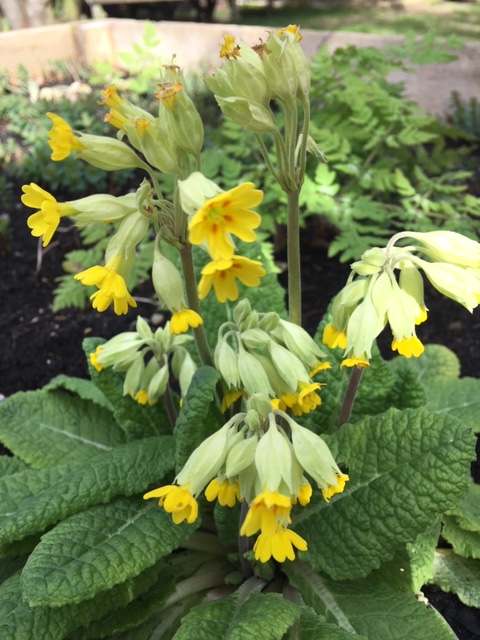
After Butterbur, the next herbs to flower are our much loved cowslips (Primula veris). Since ancient times, cowslip flowers and leaves have been made into a beauty ointment and are said to produce a beautiful complexion. Quite likely this is because of their saponin content, which acts as a detergent, and thus deeply cleanses the skin of impurities.
The flowers have, for generations, been made into a cough syrup, and also to help children sleep. Again, the saponins in the plant (especially the root) help to thin and loosen mucus, whilst the flower relieves the spasm of the bronchi.
More recently, the flower, when combined with Elderflowers, verbena and sorrel has been used to soothe the congestion of swollen sinuses caused by viruses.
It is said that the leaves are mildly narcotic, and the flowers are mildly sedative. My old herbal teacher told us that just one flower added to a cup of boiling water and a little honey or sugar, will help a restless child fall asleep.
One of its old names is palsywort, which probably refers to the herb’s ability to assuage tremors, as indeed it has been suggested as useful for the tremors of Parkinson’s Disease.
Last month a study was published which showed cowslips to have cardioprotective properties (1). They found that the plant increases the rate of contraction and relaxation of the heart, but if you have heart failure – please do not go around munching the herb. The saponins also thin the blood which will potentiate blood thinning medications.
Last year, a group studying the cousin of cowlip – the lovely primrose (Primula vulgaris), found that it can arrest cell proliferation and induce cell death in cervical cancer cells (2).
(1)^ Composition and cardioprotective effects of Primula veris L. solid herbal extract in experimental chronic heart failure. Latypova GM, Bychenkova MA, Katayev VA, Perfilova VN, Tyurenkov IN, Mokrousov IS, Prokofiev II, Salikhov SM, Iksanova GR. Phytomedicine. 2019 Feb 15;54:17-26. doi: 10.1016/j.phymed.2018.09.015. Epub 2018 Sep 5. DOI: 10.1016/j.phymed.2018.09.015
(2)^ Primula vulgaris extract induces cell cycle arrest and apoptosis in human cervix cancer cells. Demir S, Turan I, Aliyazicioglu R, Yaman SO, Aliyazicioglu Y. J Pharm Anal. 2018 Oct;8(5):307-311. doi: 10.1016/j.jpha.2018.05.003. Epub 2018 Jun 28. DOI: 10.1016/j.jpha.2018.05.003.
